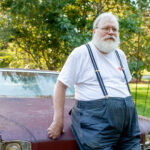
The Happiness of Saying Goodbye
Long ago, a pair of larger-than-life families—two couples with seven kids between them—rang in the new year together every year. Some bonds never break.
My friend Bo Emerson and I inherited a friendship. His parents were friends with mine. We met as babies, and our friendship has lasted a lifetime.
Kitty and Frank Ross and Lucy and Bill Emerson had a classic friendship—and seven kids between them. Three older sisters for Bo—Laurie, Lucy and Ellen—and a younger Emerson brother, John. My younger brother was Fitz. The Emersons had us outnumbered seven to four.
We spent some time in summers visiting the Emersons, but our annual New Year’s Eve visits to their place on Burnt Mountain in North Georgia are frozen in my memory. The house was not heated. It was January-in-the-Georgia-mountains cold. But there was a gigantic fireplace in the gathering room. Keeping it fed required countless trips to the woodpile. The wood was dirty and damp, with bark clinging to it. Messy business. Bo and I stacked those wet logs as high as we could in each other’s arms.
The first thing one did when waking up on New Year’s Day—after emerging from under bed covers or sleeping bags—was to haul ass to stand in front of that fireplace. We slept in our clothes. With our socks on.
The fireplace was necessarily a popular spot—eleven bodies in close, crowded configurations. We passed off our spots like precious gifts, especially to those just arriving from the outside freeze. Much time was spent looking into the fire, hearing its crackling and watching its colors. In doing so, we became part of the eternal chain of humans, who have forever sat by fires not only to be warmed but to go to a place where their thoughts could be free, where they could consider and conjure and create. A line of human existence.
There was always music. The Emerson sisters were older and ahead of me on the music trail. They played records I’d never heard. Bo played the guitar. But in that room, conversation was king. Stories were told. Laughter was frequent. Vibrant verbal exchanges danced in the air delightfully. We children absorbed it. We were encouraged to join in.
Being with the Emersons changed my family. They put us on unfamiliar terrain, both outside and inside. The Rosses were beach creatures; the Emersons were mountain people. The beach asks to be strolled as seagulls caw overhead. In the mountains, trails demand to be hiked as blackbirds call from the woods.
The beach asks to be strolled as seagulls caw overhead. In the mountains, trails demand to be hiked as blackbirds call from the woods. At the beach, the sky is as high as the ocean is wide. Open spots in the mountains feel like an offense to God.
At the beach, the sky is as high as the ocean is wide. Open spots in the mountains feel like an offense to God.
Internally, we learned lessons in the territory of friendship—observing and feeling the adults’ interactions. But each set of parents was different. Each brought their own version of love to the room.
As a minister, my father was belly to belly with the sins of man. Frank Ross was the head rector of All Saints, a downtown Atlanta Episcopal church, during the Civil Rights Movement of the 1960s. He was constantly navigating the mixed intentions of his congregation as he tried to lead them to a better world—not only in heaven but also on Earth. His basic inclination to be reserved in temperament was likely reinforced by his regular, bruising encounters with sin. Such was his seriousness that he sometimes began his sermons with, “On the way to the grave…”
As the editor-in-chief of The Saturday Evening Post, an important magazine in the 1960s, Bill Emerson was a big deal in journalism. He was larger than life, both physically and in his boisterous, affectionate storytelling. Strangers and friends of all ages were greeted as “Old Tiger” and other uncommon endearments. He was a spinner of tall tales, a master storyteller. The king of holding forth. He was Southern in a transplanted-to-midtown-Manhattan way. He was funny as hell.
He normally took over a room as soon as he spoke. But in the presence of friends like my parents, we observed him in a gear that revealed his pleasure in the company. We felt the light of friendship.
Standing in the pulpit every Sunday, Frank Ross was also used to holding a room with his words. He was not used to his words competing for attention. But in the presence of Bill Emerson’s large conversational presence, my dad relaxed and let himself enjoy it. We noticed this relaxed aspect of conversation as well. My father’s rigidity loosened.
My mom, Kitty Ross, was a storyteller with a sarcastic wit that was both lethal and hilarious. She was side by side with my dad in the struggle for civil rights and to help the poor. But she did not see life as a labor; she saw it as fun. That made her an invaluable partner in the politics of All Saints Church. Any cocktail party could be improved by the presence of Kitty Ross. With her exuberant, welcoming nature, Lucy Emerson showed my family a wider love than we were accustomed to. Her smile was sublime. Her attention felt like it belonged to each one of us. Her heart was one I aspire to emulate. My mother’s outrageousness found a soul mate in the purity of Lucy Emerson’s love, and their dynamic seeped into the bloodstreams of us children.
As children at this New Year’s party, we learned lessons in friendship. What each set of parents brought was equally valuable. The conversation, the conviviality, and the often noisy confusion all contributed to a much bigger scene than the Ross family was used to.
Thinking about those days now, I realize that not only was my family outnumbered, my brother and I were positively exposed to a feminine world. In the Emerson family, females outnumbered males four to three. In the Ross family, males led three to one.
Frank Ross had a self-imposed limit on joy. An unfortunate inheritance he left to me. We said our goodbyes, headed down the driveway, and turned right onto a muddy road in silence.
Our New Year’s trip to see the Emersons was always too short, but we gladly swallowed the Emerson vitamin. It contained exuberance. It was filled with joy. It was fun.
My New Year’s Day went from waking up freezing to wondering when my dad would say, “load up the car”—the sad reminder of an end to our brief vacation. The fun ended before Fitz and I were ready, but Frank Ross had a self-imposed limit on joy. An unfortunate inheritance he left to me. We said our goodbyes, headed down the driveway, and turned right onto a muddy road in silence. Regular life appeared in our thoughts, filling the car. I always wondered what my dad was thinking. Probably just the drive ahead.
When we turned off that narrow, wood-lined road, the world opened. The lake loomed large on the left. It gave the illusion that its waters went on forever.
Our eyes quickly turned away from it. The short drive down that lakeside road was filled with one question. Had we sadly said goodbye? Or would the Emersons’ special tradition continue? The answer was approaching us as we neared the bottom of the hill on the right side of the road. Our eyes were enormous, and our necks craned so far out the windows we might spill out of the car.
YES!! There they were: the whole Emerson family running joyfully down the hill, exultant, shouting and waving. A cavalcade of love. A physical and aural definition of friendship.
One of the best things about visiting the Emersons was how they said goodbye. The best goodbye known to man.
There was a lesson on that hillside. As their friends, we would always have a place to come to. A place where we would be welcome. Goodbye did not have to be sad. It could be done with a smile. What a revolutionary idea. Goodbye could be temporary. It did not have to be forever. We could always come back.
That hillside is in my heart.

About the author
Nelson d. Ross is an Atlanta writer. He is a sucker for songs about going home.




